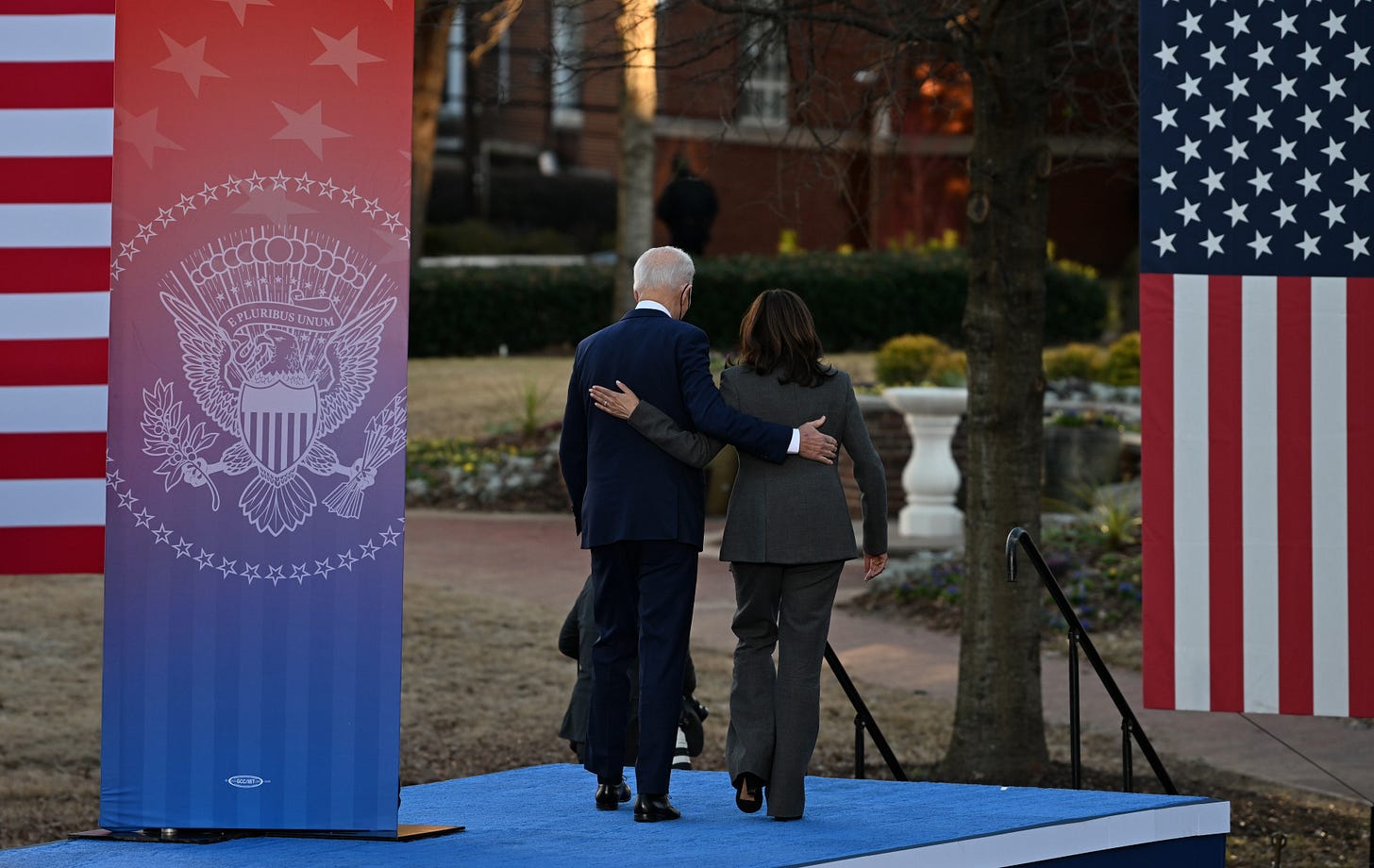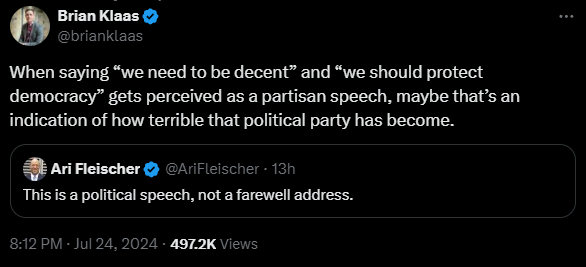A Good Speech and a Sad Spectacle
Plus: The power of incumbency and the power of change.
This morning’s good vibe, per WaPo: “The U.S. economy grew at a robust 2.8 percent annualized rate in the second quarter, capping two years of solid expansion, despite some signs of softening.”
And this morning’s terrible vibe, also per WaPo: “Southwest Airlines announced Thursday it will do away with its longtime practice of open seating.” Happy Thursday.

America the Idea
—Andrew Egger
Last night, President Biden gave a primetime address from the Oval Office, his first on-camera remarks since ending his reelection campaign.
Speaking clearly and quietly, he feted his administration’s accomplishments, reflected on his half-century of public service in Washington, praised Kamala Harris, explained his decision to step aside, thanked his fellow citizens for giving him the opportunity to lead, and spoke with feeling about “the soul of America”:
America is an idea—an idea stronger than any army, bigger than any ocean, more powerful than any dictator or tyrant. It’s the most powerful idea in the history of the world. That idea is that we hold these truths to be self-evident: We are all created equal, endowed by our Creator with certain inalienable rights—life, liberty, and the pursuit of happiness. We’ve never fully lived up to it—to this sacred idea—but we’ve never walked away from it either. And I do not believe the American people will walk away from it now.
In our livestream following the speech, some of my colleagues dinged Biden a bit for not using the opportunity to make a more aggressive case for Harris or to strike a more aggressive contrast against Donald Trump. I see their point—but there will be plenty of time for all that in the weeks ahead. The spotlight is going to be on Harris going forward; last night was about Biden and his decision. And at any rate, it was a presidential address, not a campaign speech.
But listening to the speech, it was a separate contrast that stood out to me. Not the one between Biden and Trump but between the president’s hopeful rhetoric about America and the scenes that had unfolded a few miles across town a few hours before.
The pro-Palestinian protests that rocked so many college campuses erupted again around Israeli Prime Minister Benjamin Netanyahu’s address to Congress yesterday, in which he made the case to continue the war against Hamas.
Large crowds turned out in D.C. to protest his speech, with many traveling from around the country. And things quickly turned ugly. Crowds blocked many streets, and D.C. police had to forcibly repel them from marching toward the Capitol. About half a mile from the Capitol, a small-scale riot broke out at Columbus Circle outside Union Station, where protesters scuffled with police, burned Netanyahu in effigy, tore down and burned American flags, and raised Palestinian flags in their place.
Others defaced the plaza’s monuments—the Columbus Fountain and the Freedom Bell—with reams of graffiti: “All zionists are bastards. Israel will fall. Long live the intifada. Hamas is coming.”
Police eventually dispersed the protests and made a handful of arrests.
For many Americans, it is increasingly difficult to reconcile Biden’s soaring rhetoric about America with such scenes of civil disorder. What happens if America is an idea a growing number of its younger people no longer believe in—or actively despise?
On a more practical level, the incident highlighted some of the choreography-related challenges Biden and Harris will face in the months ahead. At this moment, the Democrats find themselves a party with two leaders: When events demand a response, who will take the lead on setting the tone?
Shortly before Biden’s speech, White House spokesman Andrew Bates forcibly condemned the riot: “Identifying with evil terrorist organizations like Hamas, burning the American flag, or forcibly removing the American flag and replacing it with another, is disgraceful. Antisemitism and violence are never acceptable, period.”
Harris, as of this morning, has yet to comment directly on the news: A spokesman for her campaign pointed The Bulwark back to the White House statement.

Putting Change on the Menu
—William Kristol
Last night, here in New York City, I met up with a friend for dessert and coffee. We were at a restaurant that’s been around for a long time, the kind of place that has plaques at the booths celebrating famous patrons of the past.
It was old. And the menu featured a bunch of old desserts—along with one the restaurant claimed was ”NEW!” I have no idea if it was really new. It was actually a pretty common dessert. For all I know, it could have been featured on the menu as “NEW!” for the last two decades.
But we ordered it.
In America, even in the context of the old and the familiar, even for people who are pretty conservative in their tastes and habits, new is usually good.
Which brings us to the presidential race.
Yesterday I quoted Democratic strategist Doug Sosnik on the importance of the contest to define Kamala Harris in these next few weeks. But let me call your attention to a point Doug made in passing: “In a sense, Trump is the incumbent now, right? He’s been at this for a while. Harris just showed up.”
Donald Trump is a former president. He’s on the ballot for a third straight time. Trump is the known quantity in the race. In fact he’s a very well known quantity.
He’s also two decades older than Harris.
So, with Joe Biden stepping aside, Trump is in a way the de facto incumbent in the race.
That’s not necessarily bad for him. Incumbents win more often than not. A challenger who’s much less well known faces lots of . . . challenges.
On the other hand, Hillary Clinton was a de facto incumbent in 2016, having been in the White House for eight years and having served as secretary of state in the administration then in office. And of course Trump was the actual incumbent in 2020.
They both lost.
Incumbency is powerful. But the promise of change can also be powerful. Especially when voters perceive the country to be on the wrong track. Especially when they believe it is heading in the wrong direction. Especially when they seem to crave change.
One way to judge the success of the two presidential campaigns over the next few weeks is to ask: Who seems to be the challenger? Who seems to be the candidate of change? The incumbent vice president? Or the former president?
As a black female candidate, Harris obviously embodies change to some degree. But as Clinton showed, that won’t be enough. You need to embrace political and attitudinal change; in this case away from Biden, and oriented toward the future.
As the incumbent vice president, Harris will almost have to try to leave behind her own incumbency. Trump won’t make that easy. He’ll try to run not against Harris but against Biden-Harris.
Without disrespecting Biden, Harris has to foil that effort, and make her candidacy about breaking away from the broken politics of the past. This is one reason for her announcing a running mate as soon as possible. The faster we get to Harris-Shapiro or Harris-Kelly or Harris-Whomever, the harder it is for the Trump campaign to make the race about Biden-Harris.
Can Harris become the candidate of change? Having Trump as her opponent opens the door. She has to make her way through it.
We ordered the new dessert at the old restaurant last night. It was excellent.
Catching up . . .
2025 could be a great time to be president, economically speaking: New York Times
U.S. economy grew 2.8 percent in second quarter, a robust strengthening: Washington Post
As Trump unloads on Harris, even his supporters see her gaining ground: Politico
Jason Miller says a Trump-Harris debate ‘will happen’: Axios
Trump suggests ‘threat to democracy’ calls led to attempted assassination: Politico
Melania Trump to tell her story in memoir, Melania, scheduled for this fall: AP News
Quick Hits: JD Vance’s Brain
If elected vice president, JD Vance would make history as the first person with terminal internet poisoning ever to hold the office. Up at the site today, Martyn Wendell Jones has his number:
BY NOW, YOU’VE PROBABLY SEEN a recently recirculated 2021 clip of then–Senate candidate JD Vance attacking Vice President Kamala Harris as a representative of “childless cat ladies” who are so “miserable at their own lives and . . . choices” that they want nothing else but to bring the rest of us down, too.
It’s an ugly and misogynistic sentiment, and if it were coming from a more typical right-wing pug, it would probably have ended there—a nasty, sweaty soundbite. But Vance has a more capacious mind. He wasn’t satisfied with the insult alone; he knew he needed to sharpen his stick into a spear. So he worked in this point: “The entire future of the Democrats is controlled by people without children. . . . We’ve turned our country over to people who don’t have a direct stake in it.”
What a kicker! It creates the mental impression of an idea without actually leaving one for the mind to consider. Anyone who is alive in our country has a stake in its future, of course, but Vance isn’t talking just about our own lifetimes. He’s on the civilization beat. He is trying to think in centuries. . .
The man doesn’t just have cracked beliefs but cracked instincts. Almost endearingly, he and his pals seem to think that workaday politics is an opportune context for doing a bit of grand theory, and further, that their theorizing will help them win over the citizens of the U.S.A., a country whose most notable contribution to philosophy is literally called pragmatism. The affliction is ubiquitous among hyper-online right-wingers.
Cheap Shots
Correction, July 25, 2024, 9:52 a.m.: This newsletter was updated to correct a misquotation of Biden’s speech.





"For many Americans, it is increasingly difficult to reconcile Biden’s soaring rhetoric about America with such scenes of civil disorder. What happens if America is an idea a growing number of its younger people no longer believe in—or actively despise?"
And what happens if we see those protesters, or more likely a subset among them, for what they are: a small fringe group of extremists who do not represent the beliefs or the behavior of the vast majority of Americans? It's easy to see these people as making a statement when they stick out like a sore thumb. But reasonable people also know that there is a big difference between peaceful protest and out of control activism. We've all hashed this out before -- it is possible to be pro-Israel and pro-Palestine at the same time while opposing Hamas. Those same reasonable people understand that the graffiti warriors and avowed Hamas sympathizers, perhaps acting out of emotion rather than forethought, are a distinct minority among us. They harm rather than help their cause when they go past the boundaries of appropriate behavior. If someone believes that this small group is empirical evidence that more and more young people do not believe in America as a concept -- never mind despise it -- I'll ask them to show me the receipts for verification. I don't see it as I'm on my college campus. Or at my grocery store. Or at a park or a ballgame or my church. Blowing the issue out of proportion is more likely to cause a crisis than the deeds of a very small fringe group of activists who lose credibility the moment that they take the law into their own hands and vow support for a known terrorist group. We are smart enough to know that, and we should act like it as the adults in the room.
I listened to the post-speech livestream as a podcast this morning and was surprised by the negativity. I feel confident that Biden will do all of the endorsing of Kamala that was being called for in the coming weeks and months--most especially at the convention. Why not let him have a night to tell Americans that he has done a lot for the country, and that he experienced this as a painful relinquishment of personal ambition and hope, in favor of the good of the country?
To me, the bumpiness of the delivery did highllight why he had to do what he did, but I thought the content was just right for the moment.